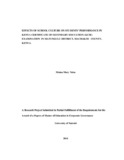| dc.description.abstract | School culture is related to students’ achievement in that if school culture is not
hospitable to learning, then students’ achievement can suffer. School culture therefore
has a more powerful effect on students’ achievement than any other
variable(Watson,2001).The purpose of this study was to investigate the effects of school
culture on students’ performance in Kenya Certificate of Secondary Education (KCSE)
examination in Matungulu district, Machakos County, Kenya. Four research objectives
were formulated to guide the study. The objectives sought to establish how school vision,
mission and values, frequent communication through school assemblies, motivation
through prize giving and continuous assessment tests influence students KCSE
performance. This study used descriptive survey design. The target population for this
study was 35 head teachers, 336 teachers and the 8571 students in the district totaling to
about 8,945 respondents. Stratified and random sampling technique was used to select the
sample for the study. The sample size comprised of 333 respondents, categorized as all 9
head teachers in the nine sampled schools, 67 teachers (20% of the 336 teachers) and 257
students (3% of the 8571 students). Data was collected by use of questionnaires and was
analysed by use of descriptive and inferential statistics. Findings revealed that there was a
positive relationship between mission, vision and values and students ’performance as
indicated by a correlation of 0.63. Findings also revealed that there was a positive
relationship between communications through school assemblies and students’ KCSE
performance as indicated by a coefficient of 0.69 which implied that communication
through school assemblies had a strong influence of KCSE performance. Findings also
revealed that there was strong positive (0.72) correlation between motivation through
prize giving and students’ KCSE performance. Findings further revealed that there was a
positive relationship between continuous assessment tests on students’ KCSE
performance as shown by a coefficient of 0.65. The data implied that continuous
assessment tests contributed 65 percent to students KCSE performance. Based on the
findings of the study, it was concluded that elements of school culture affect the
performance of students in KCSE examination in Matungulu District. Head teachers visit
class rooms during administration of continuous assessment tests. Both students and
teachers were not fully motivated to achieve their best performance. The study
recommended that the school administration should support holding of more frequent
assemblies so that head teachers, teachers and students can be able to share and discuss
how to improve their academic performance; that teachers should offer more frequent
continuous assessment tests to their students to enable them to be more confident and
ready for the final KCSE examination. That the school administration should create
various student and teacher motivation methods that will fully motivate and challenge
them to do their best. Taking the limitations and delimitations of the study into
consideration, it was suggested that a study on the extent at which financial constraints,
indiscipline among students and students’ low entry behaviour affect student performance
in the district should be conducted. | en_US |



